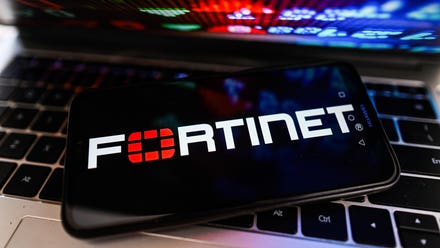Fortinet: Potentially Undervalued With High Growth In Cybersecurity

- Share to Facebook
- Share to Twitter
- Share to Linkedin
The company’s valuation multiples have contracted due to lower growth expectations
By Oliver Rodzianko
Summary
- Fortinet is undervalued due to lower projected earnings growth, presenting a buying opportunity despite balance sheet concerns.
- The company offers cost-competitive cybersecurity solutions with over 755,000 customers, but faces fierce competition, which might consolidate more contracts.
- Despite weaker projected growth, Fortinet’s operational efficiencies, strong market presence and potential undervaluation make it a moderate alpha opportunity.
Cybersecurity company Fortinet Inc. (FTNT, Financial) is arguably undervalued at the moment because analysts are forecasting slower earnings and revenue growth compared to historically, which has contracted the valuation multiples, opened up room for potential inefficiencies and presented a buying opportunity.
That being said, the company’s balance sheet is weaker than usual with negative equity, which should ease because it is impacted significantly by unearned revenue despite long-term debt being added in 2021 for the first time since its initial public offering.
As such, I think this is a value opportunity, but investors should not expect high alpha.
Operational analysis
Apple iPhone 16 Pro: New Leak Reveals Powerful Design Upgrade Incoming, Report Says
Leak Reveals A ‘Big’ Fed Earthquake Could Suddenly Smash The Price Of Bitcoin, Ethereum, XRP And Crypto
Today’s NYT Mini Crossword Clues And Answers For Friday, July 26
With a $45.45 billion market cap, Fortinet’s product portfolio is extensive and includes advanced artificial intelligence-powered threat protection, network security, secure access and security management tools, among other products and services.
The company has over 755,000 customers, but faces significant competition from Palo Alto Networks (PANW, Financial), Cisco (CSCO, Financial) and CrowdStrike (CRWD, Financial). However, none of these companies offer the same undervaluation and high growth prospects as Fortinet does at this time.
function loadConnatixScript(document) {
if (!window.cnxel) {
window.cnxel = {};
window.cnxel.cmd = [];
var iframe = document.createElement(‘iframe’);
iframe.style.display = ‘none’;
iframe.onload = function() {
var iframeDoc = iframe.contentWindow.document;
var script = iframeDoc.createElement(‘script’);
script.src = ‘//cd.elements.video/player.js’ + ‘?cid=’ + ’62cec241-7d09-4462-afc2-f72f8d8ef40a’;
script.setAttribute(‘defer’, ‘1’);
script.setAttribute(‘type’, ‘text/javascript’);
iframeDoc.body.appendChild(script);
};
document.head.appendChild(iframe);
const preloadResourcesEndpoint = ‘https://cds.elements.video/a/preload-resources-ovp.json’;
fetch(preloadResourcesEndpoint, { priority: ‘low’ })
.then(response => {
if (!response.ok) {
throw new Error(‘Network response was not ok’, preloadResourcesEndpoint);
}
return response.json();
})
.then(data => {
const cssUrl = data.css;
const cssUrlLink = document.createElement(‘link’);
cssUrlLink.rel = ‘stylesheet’;
cssUrlLink.href = cssUrl;
cssUrlLink.as = ‘style’;
cssUrlLink.media = ‘print’;
cssUrlLink.onload = function() {
this.media = ‘all’;
};
document.head.appendChild(cssUrlLink);
const hls = data.hls;
const hlsScript = document.createElement(‘script’);
hlsScript.src = hls;
hlsScript.setAttribute(‘defer’, ‘1’);
hlsScript.setAttribute(‘type’, ‘text/javascript’);
document.head.appendChild(hlsScript);
}).catch(error => {
console.error(‘There was a problem with the fetch operation:’, error);
});
}
}
loadConnatixScript(document);
On an operational front, it has to be recognized that competition is fierce, and the larger players, namely CrowdStrike and Palo Alto, are likely to be able to consolidate their position and win more contracts due to their size. However, I have read research that indicates Fortinet’s offerings are cost-competitive and often cheaper, which allows it to stay more competitive, especially with mid-size and smaller clients.
Market cap for Fortinet and its main competitors.
GuruFocus.com
The United States is Fortinet’s core market. This cybersecurity market, as well as internationally, is expected to expand substantially with growth in digital ecosystems and increasing cyber threats, particularly from new AI-led threat variants. According to Mordor Intelligence, the U.S. cybersecurity market is expected to grow at a compound annual rate of 8% from 2024 to 2029. Statista also outlined that the global cybersecurity market could achieve a CAGR from 2024 to 2029 of 8% as well. It is likely that significant growth will be actualized by leading companies like Fortinet, Palo Alto, CrowdStrike and Cisco because they cater to many high-profile clients with extensive ecosystems. I think these technology ecosystems are likely to continue to grow and expand with the rise of AI, automation and robotics capabilities.
Fortinet currently serves Amazon (AMZN, Financial), Microsoft (MSFT, Financial) and Alphabet’s (GOOGL, Financial) Google, outlining my point.
Financial and valuation analysis
Fortinet is currently cheap compared to historical valuation multiples. The reason I think this has happened is because future earnings per share estimates from Wall Street are currently lower than historically.
The company has delivered earnings per share without non-recurring items growth of 35.30% over the past five years on average, but the future three-year growth rate is 12.43%. As a result, the average price target estimates a 19.71% increase in a year.
Analysts’ 12-month price target for Fortinet.
GuruFocus.com
This would be a lot more if the valuation multiples expand from the current levels, which is what the GF Value indicates—a potential 63.21% upside in 12 months. This might be too optimistic, but if the company can consolidate its position in cybersecurity and potentially differentiate itself further with cost competition, the upside could be more significant than the Wall Street average price target, in my opinion. This opens up a decent growth opportunity and also the potential for substantial alpha from the present good value, which could end up being great value over five-plus years if earnings per share growth rates expand.
Change in Fortinet’s price-sales and price-earnings ratio
GuruFocus.com
While the market’s concern about future growth is warranted at this time, the company has still been expanding its net, operating and gross margins, proving operational efficiencies in the face of broader restraints from competition in the cybersecurity field. In addition, Fortinet has been profitable since its IPO. That being said, its real profitability gains began around 2018.
Change in Fortinet’s net and operating margins
GuruFocus.com
However, I think it is important to place Fortinet against its two more prominent competitors, Palo Alto and CrowdStrike, to really gain insight into the discrepancies in growth here and to elucidate why the market may be valuing the stock down based on its multiples compared to historically.
Comparison of Fortinet’s revenue and net income to CrowdStrike and Palo Alto
GuruFocus.com
Fortinet has stable revenue and net income compared to the very high growth of CrowdStrike, but a much less stable bottom line, which is also applicable to Palo Alto but less pronounced. In many respects, one may look to CrowdStrike for extremely high growth, but it definitely does not offer the same value opportunity at this time. The result of this, to be frank, is that CrowdStrike is likely to generate substantially more alpha than Fortinet based on growth prospects alone.
However, the value opportunity in Fortinet is arguably latent and could yield high alpha later, but I consider the factors that would contribute to this largely speculative. My research on the industry tells me the growth CrowdStrike is achieving is likely to compound, while Fortinet may struggle to re-attain previous levels of fundamental growth.
Risk analysis
As I mentioned previously, Fortinet’s balance sheet is weak at the moment. I think this deserves detailed attention.
While the company currently has negative equity, this is not as bad as it first sounds because it has $2.91 billion in current deferred revenue, which is likely to be credited later and means it is not overburdened by more serious liabilities like long-term debt, of which it has $992 million. The balance sheet still has room for improvement, so I do think it further impacts the growth prospects of the company, but I do not think that it is so bad that it should deter investment. Further, I think it will be addressed and return to its normal equity-to-asset ratio of circa 0.30 in time.
I think there is also macroeconomic weakness in the U.S. at the moment with respect to the federal debt and broader overvaluation of the S&P 500, of which Fortinet is a part. Without a high level of federal-backed AI funding and automation efforts to reduce the cost of manufacturing and drive deflationary effects, the S&P 500 could experience selling action as a result of a contraction in overall growth rates due to lower demand because of the high price of goods for consumers. At this time, it could go either way and if the U.S. government is more proactive in AI adoption like China is, I think Fortinet could be a big beneficiary with its cybersecurity services.
However, I think valuation is paramount to look for at this time. While Fortinet is cheap compared to historically, it is still expensive with a price-earnings ratio of nearly 40 and prone to volatility as a result.
Conclusion
Fortinet is an excellent company trading at a decent valuation. I do not think the present undervaluation is significant, but I do think it is worth considering because future catalysts could mean the stock delivers significant alpha if its fundamental growth rates begin to expand. This could happen if the company more aggressively initiates differentiated pricing strategies that are attractive to middle-sized and small clients. However, as it stands, more substantial alpha is likely to be gained from CrowdStrike based purely on growth factors alone.
Disclosures
I/we have no positions in any stocks mentioned, and have no plans to buy any new positions in the stocks mentioned within the next 72 hours.



